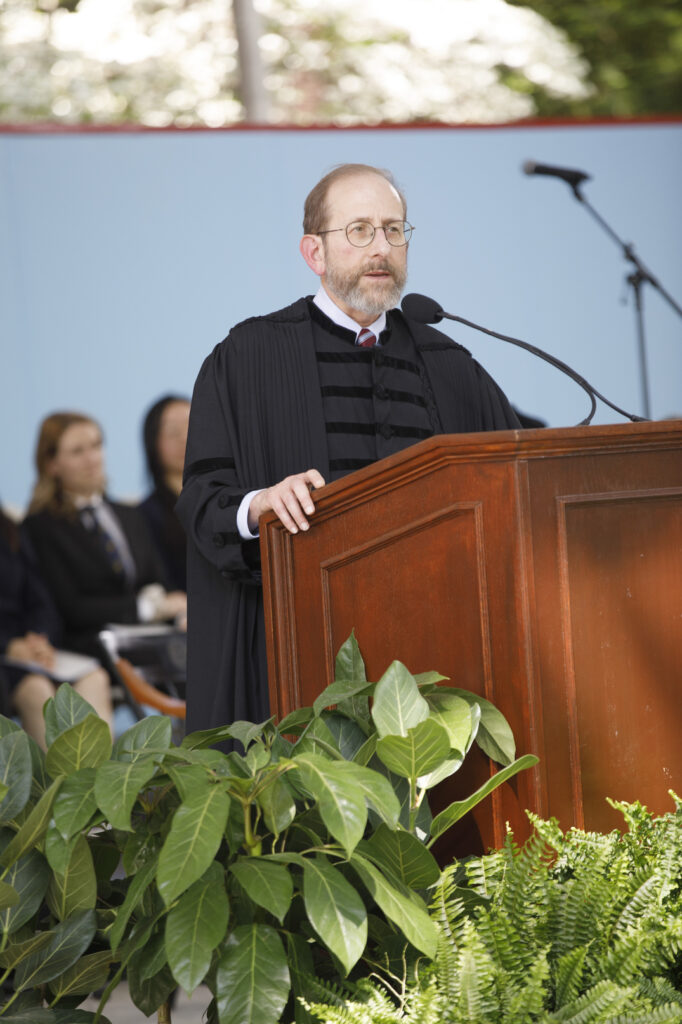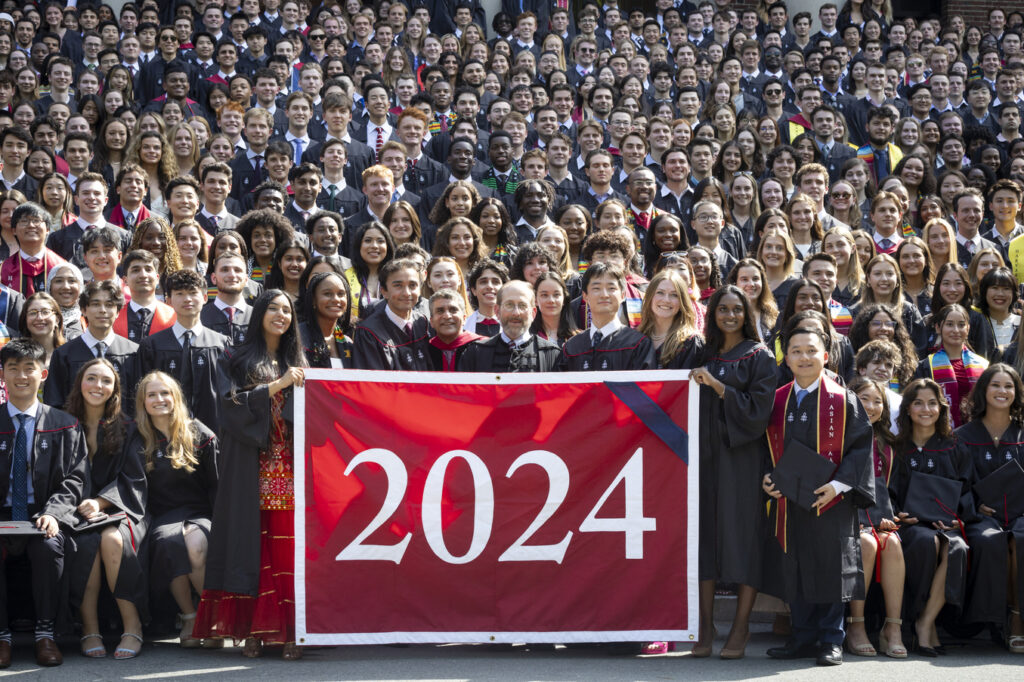Greetings, members of the Harvard College Class of 2024.
What a long strange trip it’s been.
You have been undergraduates for 1,349 days. I have been interim president for 140 days. (Not that I am counting.) Some might say that I am disadvantaged in this meeting, that I might be less than prepared to offer parting words of wisdom so late in your undergraduate journey—coming into focus for you just before I start receding in your rearview mirrors.

But—you know what they say about objects in those mirrors—we are closer than we appear.
We docs love to encounter rare cases, but, more often than not, what appears rare—and, therefore, intellectually challenging—is actually common. As we say in the profession:
When you hear hoofbeats, think of horses, not zebras.
You, however, are the genuine article—zebras through and through. There has never been an undergraduate class quite like yours, and I have followed your progress through Harvard College with great interest. After accepting our offer of admission, you were stymied by a global pandemic, deprived of many of the triumphant capstones and bittersweet milestones of high school, and confronted with upheaval and turmoil in the wake of the murder of George Floyd. All before your first semester began.
What—I wondered—would such a group of people do once they arrived at Harvard?
The answer is “everything—and more.” Did you know that a group of zebras is called a dazzle? Cast in shadow, you shined brighter than anyone could have imagined you would—defying pessimistic notions of what community could look like in a public health crisis—finding connection and joy in one another even as you swabbed and tested your way to Crimson clarity.
You excelled in the classroom, at the lab bench, and on the playing field. You garnered awards, championships, and prizes of all kinds. You improved hundreds of student clubs and organizations, pursuing interests in art and music, theater and dance, public policy, public service—even puppeteering. And, in at least one instance, you revolutionized fundraising with a fairytale boat fashioned out of an enormous pumpkin.
As you did all of these things, you somehow found the time to go all the way to the SEC and back, and you altered the administration of the University in the process, scooting your way into the student handbook and making “micromobility” part of the Harvard lexicon. We forgive you.
In these and too many other ways to count, you made life at Harvard richer and more textured. You challenged one another—and our faculty and staff—to see things differently by sharing how the world appears to you. Your experiences and perspectives were as much a part of each other’s education as any p-set or paper, and your diversity is—and always will be—an ingredient of Harvard’s excellence.
From the moment you arrived on a half-empty campus with a half-full attitude, you made the best of things—and the best of one another and yourselves. Seeing you thrive despite unpredictable and unfortunate circumstances has been, for me, a constant source of energy and optimism. So, if there is wisdom I can offer as you prepare to leave Harvard College, it is this:
Seek inspiration in one another.

You could look elsewhere, of course—and by “elsewhere” I mean “almost anywhere.” The past and the present brim with stories of Harvard people, individuals of outstanding effort and great achievement who have shaped or are shaping the course of history. That sounds hyperbolic, but if I were to list the names of luminaries in almost any field or discipline who were educated at Harvard, our time together would extend through Commencement.
What I have found in my years since graduating is that few endeavors are more entertaining, or sometimes surprising, than watching your classmates succeed. After all, you knew them as they once were, lit from within by youthful ambition and eager to conquer the world after graduation—or, perhaps, just stupefied by scrolling TikTok all afternoon. Don’t worry. My current job seemed so unlikely to my classmates that some of them must be suffering imposter syndrome by proxy.
The Harvard College Class of 1977, my class, includes some names you know—Steve Ballmer, Bill Gates, Peggy Hamburg, John Roberts—but it’s not any one of us that inspires me. It’s all of us together.
Our reunion class reports, or Red Books, are filled with stories of how fulfillment can come in myriad ways on widely varied life paths. My classmates have become artists, composers, and musicians; educators and entrepreneurs; globetrotters and trail runners. They have given TED talks about the future of news, drawn cartoons for The Economist, written for the Los Angeles Times, penned bestselling children’s books, produced Broadway shows, and climbed Mount Kilimanjaro. They’ve enjoyed the outdoors—as backpackers, birders, gardeners, cyclists, and runners—and they’ve worked to conserve the environment and protect the planet. They’ve built homes, created families, raised children, and welcomed grandchildren.
For all these many joys, however, they have also shared details of personal and professional transitions, powerful recollections of disappointment, disillusionment, and loss; and, more recently, poignant reflections on what matters most when the balance of a life has been lived: contentment, health, and love.
Their accounts of the diversity and the fullness of existence offer truth as old as this institution. What happens after any Commencement will always be a mix of sun and shade, triumph and failure, joy and sorrow. Your final assignment, if I can impose upon you, is to cheer and support one another through it all, whatever may come. There is no greater comfort than keeping ties with those who knew you when.
And, now, a parting challenge as you prepare to take your leave of Harvard College. This year, we have witnessed together incomprehensible death and destruction in the Middle East. We have experienced, directly and indirectly, grief and rage, fear and worry, skepticism and mistrust. The conflict has opened wounds throughout our community that will be slow—but not impossible—to heal.
On Thursday, we of divergent minds will process together into this space, a space created not by gains—but by losses. Behind me, Memorial Church, dedicated on Armistice Day in 1932, built by our predecessors to honor those from Harvard who served and died in the first World War. Behind you, Widener Library, opened on Commencement Day in 1915, built by a grieving mother in memory of her beloved son.
I hope we are able to heed the lessons of those who preceded us, those who chose to make from their sorrow something new, something that would last. May the losses of this year—of human life and of human connection—of sympathy and empathy—of care—be for all of you—for all of us—an impetus to advance rather than retreat, shining brightly in shadow, and brighter still through darkness.
If there is a Harvard Class that can illuminate a path forward for our world, it is yours. I am honored to have had this moment with you. I wish you contentment, health, and love—and everything else you hope to do with your precious time.
May you remain zebras among horses—dazzling every step of the way.
Thank you.

